Hello!
My name is Fujioka Takuto. I play the acoustic guitarist in an acoustic unit called BABY BABY and also I am an occupational therapist.
Thank you for reading!
Today, I would like to write about the theme of anxiety, "the reaction of the body that occurs when you feel anxious".
Are you aware of the changes in your body when you get nervous?
If you haven't paid attention to this, take this opportunity to take a look at your own condition!
I hope you will read this column to the end!
I think that everyone has felt “nervous”, when presenting, talking to a person for the first time, playing an instrument in public, and so on.
Some people say, "you will not feel nervous as you have more opportunities to do it", but is that true?
I'm usually not good at performing in public and get nervous easily.
When it comes to playing the guitar, when I'm too nervous, I feel like my body is stiff, I can't keep calm, the performance gets rough, and I make a lot of mistakes even for the phrases I could play easily during practice. It feels like it's not my body.
The degree of nervousness varies depending on the environment, but no matter how many times I stand on stage, I always get nervous.

If you get nervous, your heart rate will increase, your mind will go blank, you may get a headache, and if you use more force than necessary, your voice will crack, your movements will become stiff, and you will not be able to move as you would like to. And if you make a mistake or feel embarrassed, you will become even more nervous, creating a vicious cycle.
I’m not saying that getting nervous is bad.
What I want to say here is,
"It is bad for you to increase your anxiety and weaknesses due to mistakes caused by nervousness."
Let's call it "bad anxiety" here.
That means,
You use your body differently than usual when you feel nervous, causing more mistakes.
↓
Even if you feel nervous, if you are able to use your body as usual, you will make less mistakes.
↓
If mistakes are reduced, you will feel less anxious and more confident!
↓
If you feel less anxious, the bad anxiety will disappear!!!
After I started thinking like this, I tried to focus on "what happens to my body when I get nervous".
After self-analyzing, I found that I was in the following state when I was nervous.
・Facial expressions becomes stiff.
・Eyes keep moving.
・Both shoulder blades rise
・Breathing becomes shallow
・I get slightly stooped (pelvis tilts backward)
・The front of the thighs get tense.
(I think that each person has different symptoms when they are nervous) When I paid attention to my body and actually looked at it, I noticed that these symptoms occurred subconsciously.
Therefore, when the above symptoms occurred before or during the live show, "I tried to stop these movements and return to the original state of relaxation".
It means that I tried to get into the same physical condition as usual (the condition when I am not nervous).
At first, it was difficult to control, especially when I was really nervous, and I couldn't focus on my body like I wanted to.
Therefore, I started to try to focus on my body movements and my strength in daily life when I am not nervous to get used to controlling my body.
By doing so, little by little, I became aware of body movements that I was doing subconsciously before, like "Oh, my shoulders are rising more than necessary now", and “I am stooping and my breath is shallow”, and I became able to control them.
I gradually began to understand how my body was moving, whether I was in an unnatural posture, and whether unnecessary force was applied to my body.
If you don't know if unnecessary force is applied to your body, please make a fist and hold it as hard as you can.
Let's assume that this state is "a state of being tense, applying unnecessary force".
If you hold it tight, your wrists will become tense and you will not be able to move it freely.
Next, relax your hand as much as you can, still keeping your hands in a fist.
This is the state where "you can control your body with the minimum amount of force you need." In this state, you can turn your wrist with your fist closed.
Try to grasp this difference in sensation.
In this way, if you can "control the body to only use the necessary amount of force for that movement", you will be able to perform in a normal state, even if you get nervous.
When you get nervous, your sight narrows and you tend to forget about your body.
I talked about [Can anxiety be treated?], but I don't think that anxiety can be easily treated. It takes time to get rid of tension and anxiety.
However, if you pay attention to the unnecessary force and the posture as "symptoms" when you are nervous, you can control the symptoms yourself.
If you can control your body with your own will, you will feel a little more relaxed and your anxiety will be reduced.
It is also important to know the cause of anxiety.
Whether you are worried about making mistakes, or you are feeling stressed by what people think about you, or you did not practice enough in the first place? I think each person has their own causes.
I think, in most cases, anxiety is being caused mentally, but once the cause becomes clear, you can see yourselves a little more objectively.
I feel that many people think being nervous is uncomfortable, but if you try to face it, the cause may be surprisingly simple.
I get still nervous when I stand in front of people, but let's continue to enjoy music instead of giving up!
Bye now!


























